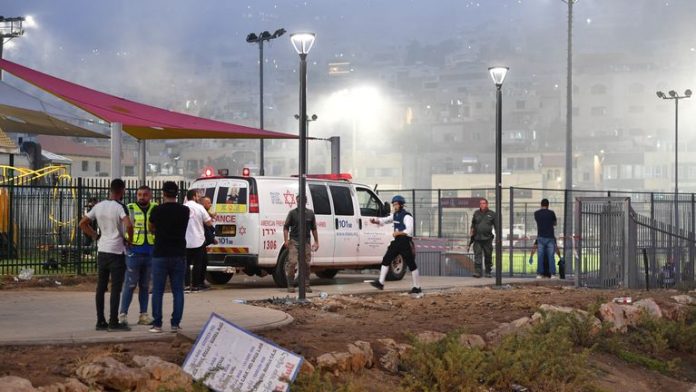The Israeli government claimed the Iranian-backed Lebanese group Hezbollah was responsible for the rocket attack on a football field in the Golan Heights, which is under Tel Aviv’s control.
Israeli officials said at least 12 people died and more than 30 wounded on Saturday when several rockets struck the village in the Israeli-controlled Golan Heights. Hezbollah, for its part, denied any responsibility for the strike, which was the deadliest against Israel since the beginning of the conflict in the Gaza Strip. The missile hit the football field in the Druze village of Majdal Shams (the town is just a few kilometres from the border with Lebanon) in the Israeli-occupied Golan Heights, a territory Israel captured from Syria in the 1967 Middle East war, but the Israeli move goes unrecognised by most countries.
In the evening, videos and images circulated on social media showing a column of smoke over the city. The footage shows the shell fell between a football field and a children’s playground. Israeli army spokesman Daniel Hagari said Saturday night that sirens sounded, but the victims may not have had time to seek shelter. It was initially unclear why the rocket failed to intercept. It also rejected claims by the Lebanese side that it was not responsible for the attack because the attack involved an Iranian Farak-1 missile, which is in service only with Hezbollah.
Israeli President Yitzhak Herzog condemned the rocket attack, while Israeli Prime Minister Benjamin Netanyahu said in a telephone conversation with the leader of Israel’s Druze community that Hezbollah “will pay a heavy price.” On Saturday night, the prime minister ordered a flight back as soon as possible and said he would convene his security cabinet upon arrival. He is due to arrive in Tel Aviv on Sunday morning.
Overnight, shortly after the attack, Israeli warplanes carried out airstrikes against targets deep inside Lebanese territory and in southern Lebanon, according to a military statement Sunday morning. The Israel Defence Forces (IDF) struck a number of Hezbollah targets, including weapons caches and terrorist infrastructure, the statement said. Netanyahu’s far-right coalition ally, Finance Minister Bezalel Smotrich, called for tough retaliation, including against Hezbollah leader Sayyed Hassan Nasrallah.
For the death of children, Nasrallah should pay with his head. All of Lebanon should pay. according to Smotrich.
The United States, now at the centre of diplomatic efforts to de-escalate the conflict on the Lebanon-Israel border and the Israel-Hamas war, condemned the attack as horrific and said US support for Israel’s security remains steadfast against all Iranian-backed terrorist groups, including Lebanon’s Hezbollah.
Washington “will continue to support efforts to end these terrible attacks along the Blue Line, which must be a top priority,” according to the spokesperson for the White House National Security Council in a statement. The deadly Hezbollah strike could trigger a full-scale war between Israel and the Iranian-backed terror group, according to a Biden administration official. “What happened today could be the trigger we have been worried about and tried to avoid for 10 months,” the official told Axios.
I strongly condemn this bloodbath. We need an independent international investigation into this unacceptable incident. We urge all parties to exercise utmost restraint and avoid further escalation, the European Union’s High Commissioner for Foreign Affairs and Security Policy, Josep Borrell, said in a post on X.
Russia, which has ties to most of the key players in the Middle East, including Israel, Iran, the Palestinian Authority and Hamas, condemned the attacks on the Golan Heights. “We condemn all terrorist actions undertaken by any entity,” according to Russian TASS state news agency cited Russian Foreign Minister Sergei Lavrov.
Some IDF units previously deployed along the country’s northern border have been redeployed to southern Israel following the 7 October attack and Israel’s subsequent ground invasion of Gaza.
Lebanon and Israel and have been at war for decades, but recent tensions have yet to escalate into full-scale conflict. Strikes have increased in frequency in recent weeks, with Hezbollah and Israel hitting targets farther and farther into each other’s territory. Tensions rose further in the past few weeks when Israel killed two senior Hezbollah commanders, Sami Taleb Abdullah in May and Mohammed Niamah Nasser in June. Hezbollah responded by firing hundreds of rockets at Israel.
